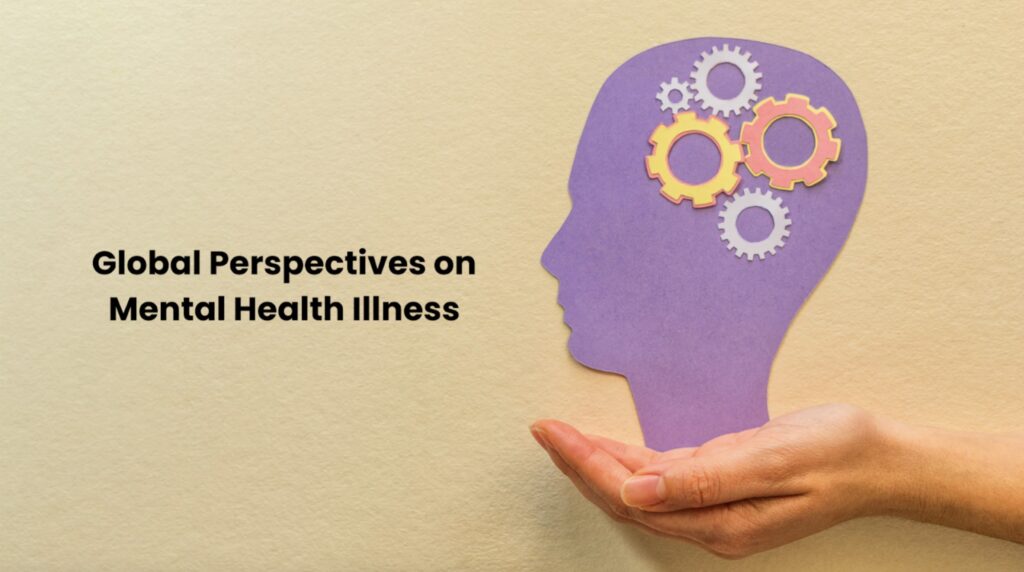We must also spotlight our mental health, which is crucial to overall wellness. What exactly does the phrase “Mental Health Illness” refer to, and how do various cultures worldwide deal with mental health? In this blog, we begin our adventure worldwide to discover What is Mental Health Illness. We will also explore the significance of Mental Health Training, stressing the necessity for educated professionals to increase empathy for and assist those struggling with mental health issues all over the globe.
Table of contents
- Explain the concept of Mental Illness
- Insights from Around the World into Mental Health
- Mental Health Education’s Importance
- Ending the Impasse
- The Impact of Socioeconomic Factors
- Innovative Approaches to Global Mental Health
- Conclusion
Explain the concept of Mental Illness
Mental health disorders include a wide spectrum of problems that negatively affect a person’s emotional, psychological, and social life. Common mental health issues like anxiety and sadness may range in degree and influence more serious diseases like schizophrenia and bipolar disorder. Many different elements, including genetics, the environment, and one’s way of life, might contribute to developing mental health disorders.
Mental health problems are a universal problem, affecting individuals of all cultures and socioeconomic backgrounds. Depression is the biggest cause of disability globally, affecting over 264 million people, according to the WHO. Suicide is a major public health problem worldwide because it claims the lives of an estimated 8,00,000 people annually. There is a worldwide need for more knowledge, understanding, and support for mental health issues.
Insights from Around the World into Mental Health
Mental health views vary by culture. Their culture greatly affects mental health awareness and treatment. People may wait to get care for mental health due to stigma. However, some cultures may be more accepting of mental health issues. Mental health providers must first grasp cultural differences to succeed.
Treatment for mental health issues varies greatly from one location to another. Medicine may be preferred in certain countries, whereas talk therapy and counselling get more support in others. Various factors, including cultural norms, access to care, and general public understanding of mental illness, influence these differences. Mental health treatment must be open and flexible to accommodate these global viewpoints.
Mental Health Education’s Importance
Mental health experts are essential for awareness, support, and treatment. Professionals must get mental health training to aid individuals with a variety of conditions.
As public awareness of mental health grows, so does the demand for skilled professionals. Mental health training helps professionals serve their communities and sets an international standard for treating mental disease. Standardisation may lead help seekers to feel they will always get evidence-based therapy.
Ending the Impasse
Mental health stigma must be removed via advocacy and education. Communities, governments, and people may combat prejudice, increase awareness, and support the poor. Growing mental health awareness and access to high-quality treatment may make the world more caring and supportive.
Giving individuals the skills to manage their mental health is another global mental health movement goal. Self-care, coping skills, and mental health discussions are stressed. We can help individuals live happier, healthier lives by increasing resilience and mental health management.
The Impact of Socioeconomic Factors
Income, education, and social support greatly affect mental health. These differences in mental health treatment and funding might worsen the worldwide issue.Income disparity frequently influences mental health care access. Therapy and medicine are difficult for low-income people to get in many countries. Financial hardship may delay treatment and aggravate mental health concerns.
Mental health awareness and treatment are also affected by education. Lower-educated communities may know less about mental health issues and services. Awareness and education are key to overcoming these obstacles. Mental health requires strong social support. Mental health is better in socially connected communities. Conversely, social isolation and lack of assistance may increase mental health risks.
Innovative Approaches to Global Mental Health
Technology innovations have expanded worldwide mental health solutions. In low-resource areas, these new methods are making mental health treatment more accessible and convenient.
Telehealth services like virtual therapy and counselling are growing. They offer remote mental health professional connections, removing geographical boundaries and boosting treatment in disadvantaged regions. The development of mental health applications democratised help. These applications include self-help, mood monitoring, and guided meditation. They encourage self-management of mental health.
Conclusion
Disturbed mental health affects individuals from all walks of life and all parts of the world. The first step in overcoming this worldwide problem is defining mental health illness. Collectively, we may strive towards a future where mental well-being is a worldwide priority by considering different cultural viewpoints, accepting different treatment options, and supporting Mental Health Training. To build a more caring and supportive global society where everyone may prosper, breaking the silence and promoting understanding is essential.For more information you can visit the website: The Knowledge Academy





